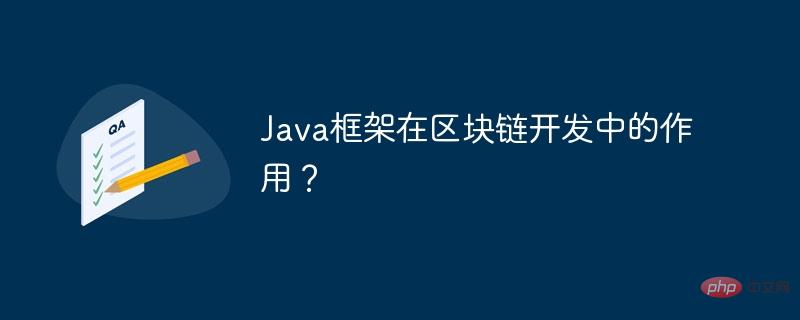Home >Java >javaTutorial >What role does Java framework play in blockchain development?
What role does Java framework play in blockchain development?
- WBOYWBOYWBOYWBOYWBOYWBOYWBOYWBOYWBOYWBOYWBOYWBOYWBOriginal
- 2024-06-01 15:45:02984browse
In blockchain development, Java frameworks are crucial, empowering developers by providing a foundation for building secure, scalable and reliable blockchain applications. Key benefits of these frameworks include: Rapid Development: Pre-built components speed up the development process; Security: Follow best security practices to protect applications from attacks; Scalability: Modular development enables applications to be easily extended; Interoperability Interoperability: Interaction with other blockchain protocols enhances interoperability.

The key role of Java framework in blockchain development
In blockchain development, Java framework plays the most important role plays a vital role in providing developers with a strong foundation for building secure, scalable and reliable blockchain applications. This article will delve into the use of Java frameworks in blockchain development and illustrate it by providing practical examples.
Purposes of Java Framework
Java framework provides the following advantages to blockchain developers:
- Rapid development: The framework pre-builds many of the components required for blockchain development, speeding up the development process.
- Security: Frameworks generally follow best security practices that help protect blockchain applications from attacks.
- Scalability: The framework supports modular development, allowing applications to easily expand to meet growing needs.
- Interoperability: Frameworks often support interaction with other blockchain protocols, enhancing interoperability.
Practical Case: Hyperledger Fabric
Hyperledger Fabric is a popular Java framework for building permissioned blockchain networks. Its key features include:
- Modular Architecture: Fabric architecture is very modular, allowing developers to customize and combine components.
- Strong consistency: Fabric uses a consensus mechanism to ensure strong consistency of transactions, thereby preventing double spending and other errors.
- Scalability: Fabric can scale horizontally using channels and chaincodes to handle high throughput.
Code Example
The following code demonstrates how to use Fabric to create a simple blockchain application:
public static void main(String[] args) {
// 创建一个新通道
Channel channel = createChannel("myChannel");
// 加入通道的组织
Organization org1 = addOrganization(channel, "org1");
Organization org2 = addOrganization(channel, "org2");
// 安装并实例化链码
Chaincode chaincode = installAndInstantiateChaincode(channel, org1);
// 使用链码执行事务
invokeChaincode(channel, chaincode);
}This code shows Provides key functionality of the Fabric framework, including creating channels, adding organizations, installing chaincode, and executing transactions.
Conclusion
Java framework is crucial for blockchain development, providing fast, secure, scalable and interoperable solutions. Frameworks like Fabric enable developers to build complex blockchain applications that meet the unique needs of a variety of industries.
The above is the detailed content of What role does Java framework play in blockchain development?. For more information, please follow other related articles on the PHP Chinese website!
Related articles
See more- Analyze the blockchain in detail through Python functions
- Blockchain is an interlocking computing system
- What challenges does the Java framework face when improving development efficiency?
- Application of load balancing strategy in Java framework performance optimization
- How to evaluate and choose the right java framework?

